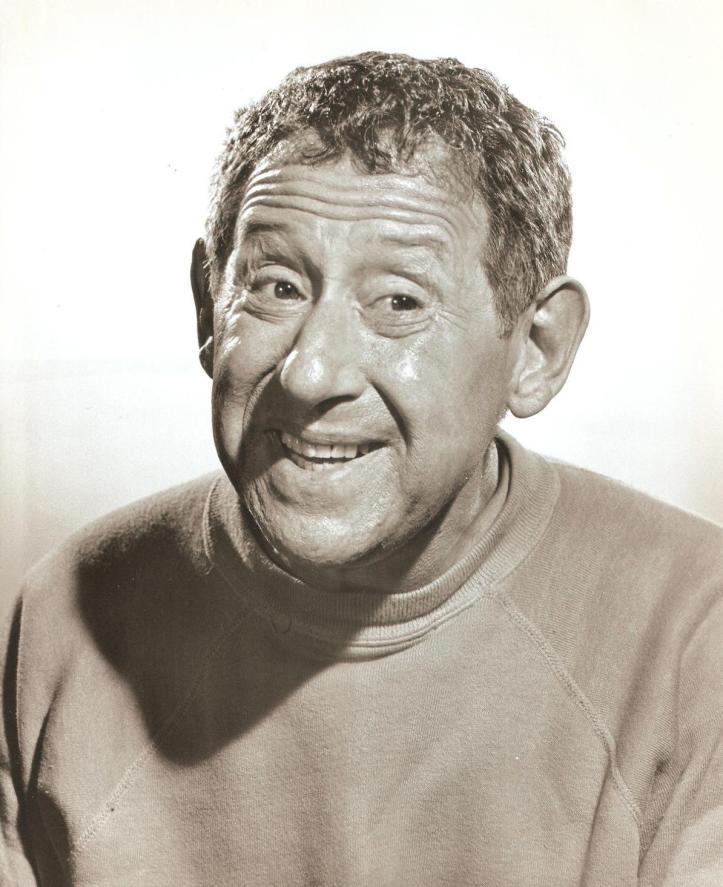
Happy birthday to Jack Gilford (Jacob Aaron Gellman, 1908-1990). This universally beloved pop culture figure was perhaps more present than ever on the American landscape during his last years, between the Crackerjack commercials and the Cocoon movies. His was a quiet, gentle presence, and I realize in retrospect that he was a pathway in for my appreciation of Harpo Marx. When I read about his early career, it sounds like his live act was even more Harpo-esque.

One reason I haven’t yet written about Gilford is that it has always been a little unclear to me whether he’d literally performed in vaudeville or not. That was my original impetus for writing performer biographies and I was originally fairly strict about my definition of vaudeville as consisting of the actual circuits, which had passed from the scene by the early 1930s. Gilford was definitely old enough to have performed in the literal vaudeville. Many obituaries and capsule biographies speak of Gilford as having been in vaudeville, but this was frequently done in such squibs. But it is at best an assumption. Until I see some specifics, i.e., what theatre, what city, what year, which will require more research, I will have to keep the idea of Gilford in vaudeville what it is: vague and uncertain. (The biggest irony of all this, I actually knew and briefly worked with one of Gilford’s sons at Theater for the New City, but, as often happens when I meet relatives of famous people, I erred on the side of not peppering him with questions about his dad. I may reach out to him now to try to get a better handle on the story).
You can definitely say that in STYLE Gifford was vaudevillian, and certainly was greatly influenced by vaudeville. He has much in common with Zero Mostel, with whom he was later to work so wonderfully in A Funny Thing Happened on the Way to the Forum. Born on the Lower East Side, raised in Williamsburg, the son of Jewish immigrants, he was later to live in Greenwich Village — and lived there until he died. And though he did lots of film and tv, he really made his biggest mark on Broadway. He really was a cradle to grave New Yorker. Like Mostel, he cut his comedy teeth working in the Catskills and in New York City night clubs and cabarets. It is said that he competed in amateur nights against the likes of Jackie Gleason, and that Milton Berle was an early mentor. His act was a blend of monologue, impressions, and pantomime. His repertoire included imitations of Harry Langdon, George Jessel, Rudy Vallee, and many others. In 1936, he got to do a version of his act in a movie short called Midnight Melodies. By 1938 he was the emcee at a club called Cafe Society, a high profile engagement. In 1940, he was booked in the Broadway revue Meet the People with Jack Albertson, Nanette Fabray, and Doodles Weaver. The Broadway play They Should Have Stood in Bed (1942) may have been his first straight acting gig.

Throughout the ’50s his time seemed about equally divided between doing his comedy specialty in clubs, revues, and on tv; and acting in roles in Broadway, tv, and films. Again, like Zero Mostel, his devotion to left wing causes is thought to have hindered his career for a time due to the blacklist. But by the mid 1950s, his Broadway career was dazzling. Just a few highlights: the original productions of The Diary of Anne Frank (1955-1957), Once Upon a Mattress (1959-1960), Paddy Chayefsky’s The Tenth Man (1959-1961), A Funny Thing Happened On the Way to the Forum (1962-1964), Cabaret (1966-1969), and Sly Fox (1976-1978), as well as the smash revival of No, No, Nanette (1971-1973) with Ruby Keeler. His last Broadway show was an adaptation of The World of Sholom Aleicheim (1982), which he’d originally done on television in 1959. He also did tv versions of many musicals, and guest shots on almost every tv show known to man. Some of his notable films include the movie version of Forum (1966), The Incident (1967), They Might be Giants (1973), Save the Tiger (1973 — for which he was nominated for an Oscar), Harry and Walter Go to New York (1976), Ringo Starr’s Caveman (1981), the Cocoon films (1985 and 1988), and Arthur 2: On the Rocks (1988). In 1988, he was on Golden Girls which brings us full circle to the person we began blogging about this morning, Estelle Getty. It is a synchronicitous morning.
To learn about vaudeville history, see No Applause, Just Throw Money: The Book That Made Vaudeville Famous, available wherever fine books are sold.

a great book written by Zero’s and Jack’s wives https://www.amazon.com/Years-Show-Business-Kate-Mostel/dp/B000NYM5DS
LikeLike
Jack Gilford and Lou Jacobi replaced Jack Albertson and Sam Levene in the original Broadway production of The Sunshine Boys. They were easily the equal of the original stars of that wonderful tribute to the great vaudeville comedy teams. So you could say that Jack was certainly an honorary vaudevillian, at the very least.
LikeLiked by 1 person